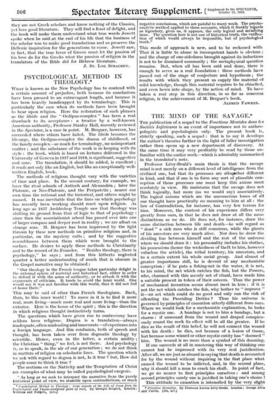PSYCHOLOGICAL METHOD IN THEOLOGY.*
WHAT is known as the New Psychology has to contend with a certain amount of prejudice, both because its conclusions have been pressed to an extravagant length, and because it has been heavily handicapped by its terminology. This is particularly the case when its methods have been brought to bear upon religion. Here the reiteration of such phrases as the libido and the " Oedipus-complex " has been a real
drawback to its acceptance : a treatise by a well-known American authority, Professor Stanley Hall, recently reviewed in the Spectator, is a case in point. M. Berguer, however, has succeeded where others have failed. The libido becomes the life-urge, the Oedipus-complex the drama of childhood, or the family complex—so much for terminology, no unimportant matter ; and the substance of the work is in keeping with its style : the book, which is based on lectures delivered in the University of Geneva in 1917 and 1919, is significant, suggestive and sane. The translation, it should be added, is excellent ; it reads not only like an English, but like an exceptionally well- written English, book.
The methods of religious thought vary with the varieties of time and place. In the second century, for example, we have the rival schools of Antioch and Alexandria ; later the Platonic, or Neo-Platonic, and the Peripatetic ; nearer our own time the rational and the historical, and others might be named. It was inevitable that the lines on which psychology has recently been working should react upon religion. As long ago as 1857 Archbishop Temple saw that theology was shifting its ground from that of logic to that of psychology : since then the associationist school has passed over into one of larger compass and deeper root in reality ; we are afloat on strange seas. M. Berguer has been impressed by the light thrown by these new methods on primitive religions and, in particular, on the mystery cults ; and by the suggestive resemblances between them which were brought to the surface. He desires to apply these methods to Christianity and to the record of its Founder. "Besides theology, there is psychology," he says ; and from this hitherto neglected quarter a better understanding of much that is obscure in the Gospel narrative may be obtained :
"Our theology in the French tongue takes particular delight in the external sphere of material and historical fact, either in order to defend it with the arms of authority, or to attack it with the arguments of criticism. It tends to avoid the inner world. One would say it was not familiar with this world, that it did not feel at home there."
This may be said of other than French theologians. Back, then, to this inner world ! To move in it is to find it more real, more living—much more real and more living—than the
exterior. Here is the home of the spirit ; this is the direction in which religious thought instinctively turns.
The questions which have given rise to controversy have seldom been religious. Dogma is a translation—always inadequate, often misleading and inaccurate—of experience into a foreign language. And this confusion, both of speech and thought, has been taken over from dogmatic theology by ecientific. Hence, even in the latter, a certain aridity ; the Christian "thing," we feel, is not there. And psychology is, so to speak, in the air of our generation ; we do not think in matters of religion on scholastic lines. The question which we ask with regard to dogma is not, Is it true ? but, How did people come to think it true ?
The sections on the Nativity and the Temptation of Christ are examples of what may be called psychological exegesis.
"As long as we seek to interpret the narrative from the purely historical point of view, we stumble upon contradictions, or reach
* i'sychotogical Method to Theology: Some aspects of the Life of Jesus from the Psychological and Psycho-analytical point of view, By Georges Berguer, London: Williams and Norgate, 115%k negative conclusions, which are painful to many souls. The psycho- analytic method applied to these accounts, which it frankly regards as legendary, gives us, it appears, the only logical and satistying issue. The question here is not one of historical truth, the verifica- tion of which would always be impossible, but of psychological truth."
This mode of approach is new, and to be reckoned with, That it is liable to abuse in incompetent hands is obvious ; and the charge of one-sidedness brought against its inductions is not to be dismissed summarily ; the metaphysical question remains. But, when all has been said and done, there is enough to serve as a real foundation : these methods have passed out of the stage of conjecture and hypothesis ; the results with which they present us supply the material ot solid knowledge, though this material requires to be chiselled, and even hewn into shape, by the action of mind. To have taken a real step in this direction, in so far as concerns religion, is the achievement of M. Berguer's book.
ALFRED FAWKES.


























































 Previous page
Previous page